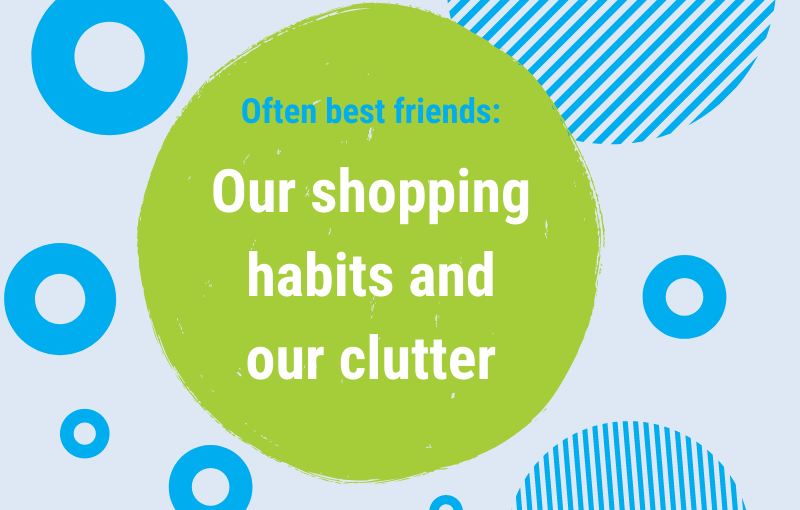THE CLUTTER SERIES
The ‘Clutter Series’ discusses important aspects of the clutter in our homes and minds, including the close relationship between clutter and our general wellbeing.
Click here to read a summary of the main insights of this series.
What causes clutter? – Part 1: The inflow of new possessions is too high
The cause of ‘fake’ clutter
In some cases, a lack of organisational systems can create the incorrect impression that our place is full of clutter.
In this case, the seemingly ‘cluttered’ area is actually not covered by clutter-items. Instead, the things lying around in a messy way are truly valued possessions, things that serve us and are used frequently.
The only problem with these spread around items is that they don’t have found a home yet, we haven’t assigned a place where they are kept between the times we use them.
The solution to this ‘clutter’ problem is to set up clear rules and to determine where we store our possessions when we don’t need/use them.
The causes of ‘real’ clutter
Usually, though, the accumulation of our ‘true’ clutter – things that don’t serve us (any longer) – is caused by an imbalance in the circulation of stuff:
-
- The inflow of new possessions coming into our home is too high,
- and the outflow of no longer used/wanted belongings is too low.
Why do we bring so much stuff into our homes?
Sometimes, we are not directly responsible for the things that enter our home:
-
- We inherit belongings from a relative,
- we take in stuff after the death of a close family member,
- we are given gifts from family and friends,
- our new partner moves in and brings along a complete set of household belongings,
- etc.
In most cases, however, we are the ones who initiate, arrange, allow the inflow of new stuff:
We go shopping.
Acquiring new things has never been easier than today and many of us spend a lot of time (and money) in shopping malls and with online shopping.
Not always, but sometimes (or often?) our shopping trips end with us carrying heavy bags of new stuff home that we actually don’t need or like.
Impulsive and excessive shopping has many causes.
We all have our own special and very personal reasons why we buy what we buy and why we sometimes acquire too many or the wrong things.
Often, we are not even aware of the motivations behind our shopping decisions.
These are some of the reasons why we acquire more than we need / are able to use:
Escape from difficult emotions
We don’t want to experience ‘negative’ emotions such as feelings of loneliness, depression, anxiety, boredom, and use shopping as a distraction or avoidance strategy.
Fear of missing out
We constantly compare ourselves with others and fear that their life(-style) is better or more exciting than ours and that we risk to fall behind if we don’t follow the latest trends and buy the current ‘must-haves’.
Reminders of past experiences
We buy souvenirs and other mementos as reminders and proofs of places we visited, achievements and experiences we made, events we attended.
Fear of lacking resources
We buy things we don’t want to use now but fear we might need/miss at some point in the future.
Running after life improvements
We believe advertisements telling us that we will feel happier, have more fun, look better if we acquire and use certain things.
There are so many other reasons – Which are yours?
When do our new possessions become clutter?
If we define ‘clutter’ as belongings that don’t serve us, we have to admit that some of our newly acquired possessions become clutter as soon as they enter our home – we never use them.
However, most of our clutter doesn’t actually start its life as clutter.
We first use/love the things we bring in, we appreciate their existence and honour their value.
But in time – over months or years – they loose their attractiveness and usefulness, we no longer need, use or like them.
If we don’t make the decision to discard them, they become clutter.
In the next article of this series, we’ll discuss the other big cause of clutter:
The outflow of no longer needed belongings is too low.

